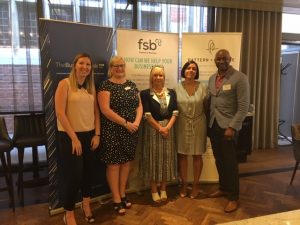Learning from disrupters is key in a fast paced property industry, says CEO of listed estate agency firm

The chief executive of York-headquartered listed estate agency, Hunters, has shared her views working in an “exciting” property industry which is currently responding to “unsustainable” high prices, a rising lettings market and lack of supply of new housing.
Glynis Frew, who joined Hunters in 1999 and was appointed CEO in 2016, also said it was also imperative to learn from disrupters in the marketplace – which have in recent years proved to Hunters the importance of online. Frew spoke to more than 60 delegates at TheBusinessDesk.com’s Women in Business lunch, sponsored by the Federation of Small Businesses and Pattern and Picture, at The Grand in York.
She shared with delegates that she thoroughly enjoyed working in the fast-paced and ever-changing industry. While she outlined the firm’s growth success, Frew said that was down to a great team who had worked hard responding to both the positives and negatives in the marketplace.
Hunters was founded in 1992, opening its first branch in York. The now-listed firm currently operates more than 200 branches – just 11 are their own; the remainder are franchised businesses – a model that Hunters launched in 2006. Frew said Hunters saw franchising as a growth opportunity which enabled a great way of working, adding: “For franchise owners themselves, what could be better than being able to drive your own business?”
Then, Hunters had to navigate the crash of 2008/09. Frew said: “It was like a light had gone out because all of sudden there was no money. Most people need money in order to transact on a property. The minute money dries up, that’s a big problem.
“At that point, anything could’ve happened. We could’ve lost everything. But we didn’t; we re-trenched, we got through it. We didn’t go and do a pre-

Frew with lunch sponsors
pack or anything.”
She said that in 2011, a “great opportunity” to buy competitor Countrywide’s franchise presented itself and that this was where their fast growth journey began. Frew described it as a “David and Golliath” scenario – where Hunters was David. “There were times, during 2011, when I thought ‘why have we done this?,” she reflected.
“They didn’t see it the way we saw it. We did have a couple of years to get them on board and we did – once we did, we were on track to become a national brand. But we didn’t just want to be the biggest, we wanted to be the nation’s favourite estate agency. We then wanted to really grow.”
In 2014, the company bought a red Hunters brand in the Midlands and in 2015, bought regional agency in Cambridgeshire, followed by another in Bristol in 2017. “We also decided we were going to float as well in 2015, when we had 126 branches. Floating a business is a great journey, it’s very exciting but there is such a lot of work,” added Frew.
Overall, between 2015 and 2018, the sales market nationwide declined by 30%, which Frew said stamp duty and rules and regulations played their part. She added: “But really, it’s part of the wider economy. What you need to remember is that the property industry loves positivity.
“But my advice is don’t listen to all the negative speak either – because properties will sell or will let at the right price. Because life goes on. People will always get married, divorced, move jobs, have children, have aspirations. The British just love property.”
Frew said that even though the market had seen decline, Hunters hadn’t. In fact, turnover and profits have risen in recent years; plus continued to be acquisitive. She added: “Against that market backdrop, how has that happened? Well, we have a three tier strategy to build, buy and improve. We get franchise owners to join us because they want training, procurement, marketing; but we reject probably 80% of those that apply. The reason we do, is because we want people in our team who absolutely believe the customer is the core of everything we do.
“We are building an independent network – we will buy, but not at any price.” Frew added that because of this approach, all Hunters branches had outgrown the market in recent years.
“Bank of Mum and Dad” and the importance of innovation
As prices are increasing in the sales market, this has seen a huge increase in properties being bought by the “bank of mum and dad” shared Frew, who

Networking at the event
said that they would be responsible for 250,000 transactions in the coming year. “It’s a big issue,” she reflected.
Frew said her wish list included for the government to build more houses because of the shortage in the market and also that there were more affordable options too.
“We [the UK] have to build property because prices are becoming unsustainable but homelessness is increasingly exponentially.”
She added that innovation was also imperative to the future of providing new housing. She named Ilke Homes in Harrogate as a great example of a different way of achieving this – bringing flat pack properties n into the marketplace. “Those kids of initiatives will be the initiatives of the future that make the difference,” added Frew.
While in the “Golden triangle” of North Yorkshire, transactions and prices have stayed the same, she said. The area has not suffered as much as other areas because “people want to live here.” She added: “It is a very good area to invest in or buy or let property.”
But cost effective areas also doing well because there is a price issue, she added.
More people are likely to rent now too, and that market has also seen prices rise due to demand, which was also a positive for landlords. Frew said lettings had “been a very interesting journey.” It is now 20% of housing tenure.
“It’s here to stay,” she reflected. Adding: “But for every let, there are 150 laws and 400 pieces of legislation. While it is safe to say the industry is not short of laws or rules, we could do with more enforcement.”
Learning from disrupters
Of the online firms entering the marketplace three or four years ago, Frew said there was a fear they were going to be the “real disrupters of the industry.”
She added: “It was expected that in a very short space of time, they would probably have 30% market share. In actual fact, that’s not happened. Their business model is about paying up front regardless.
“As the market tightens, that hasn’t proved very successful and a number have closed. I don’t want you to think, though, that I am saying that system is no good. I think there is a couple of things online agents have really taught traditional estate agents. One thing is that brands matter.
“The other is that the customer is willing and wants to communicate online. And they want to do that when your office shuts. Just because you close, doesn’t mean to say the customer’s transaction stops.
“I still believe that our model is the best because people are at the heart of a property transaction. Their [online firms] marketshare has never gone beyond 7% and is now less than 5%.
“The lesson I take from it is that it’s always important to remember that whatever industry you are looking at, you can always learn different things.”
Helping people to realise their dreams
“I love working in property because everyday is something totally different,” explained Frew when talking her more than 20-year career in the property industry.
“We help people to realise their dreams. To live in a property that they aspire to or even to actually solve a problem. Our vision is to be the nation’s favourite agent.
The world of work when she entered was very different, she said. She said it had been good to surround herself with good support and teams as she has moved through her career.
Frew said: “When I started my career, there was not a glass ceiling, there was actually a concrete one as far as business was concerned. A woman had to work twice as hard to be half as good.”
Now that had all changed, she said, although she does still work in a male dominated industry. Frew concluded: “I believe in the business and the property market, I have the most amazing confidence on our team. We run a good business, it’s exciting and it’s good to work alongside them. on;t listen to the negatives. British has an affinity to the property market.
“Nobody can destroy the aspiration to live somewhere or in somewhere where you wanted to live. That is intrinsic in us all.”








